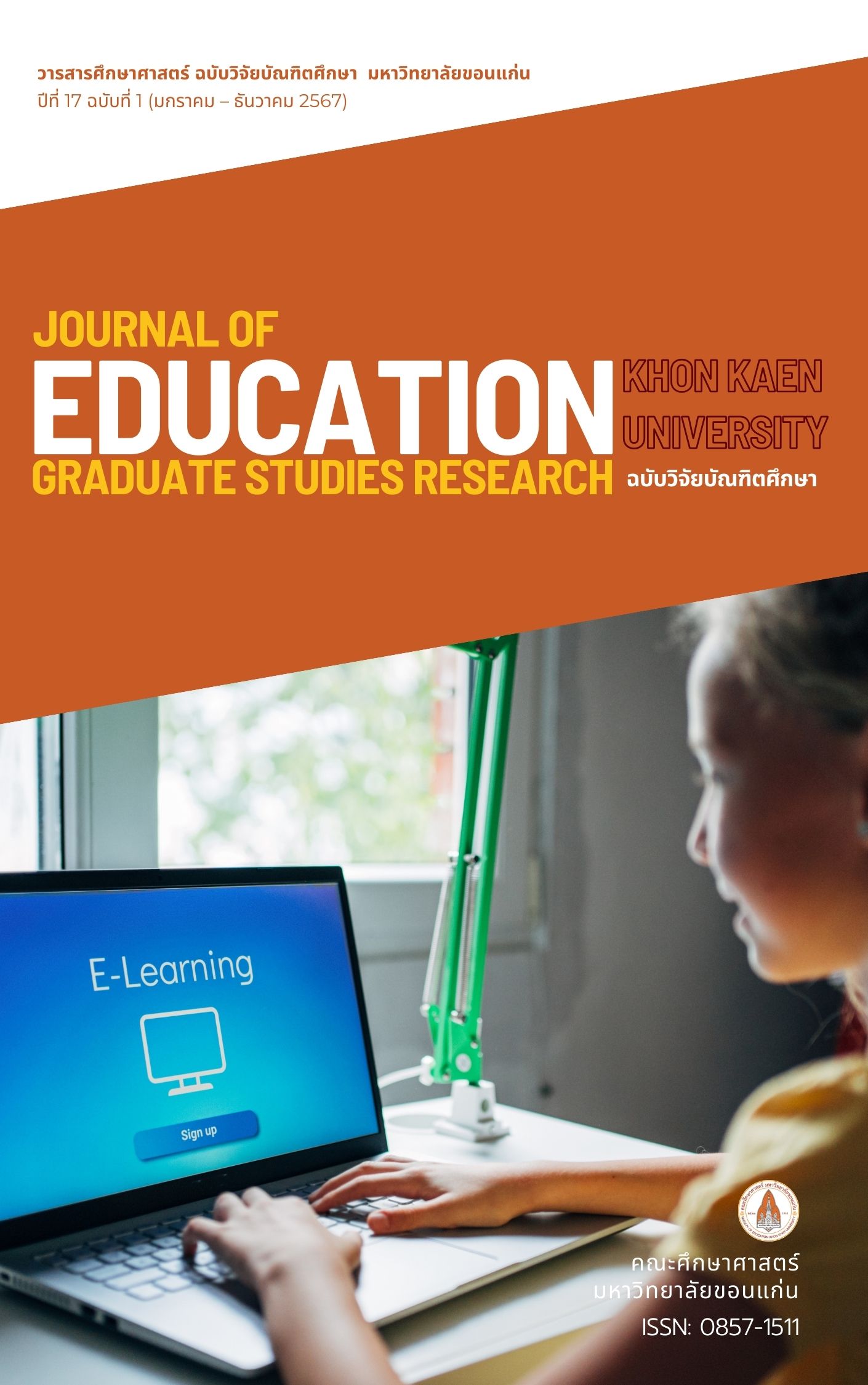A study of status quo and factors affecting student’s decision making of perusing to study in Bachelor of Science Education Programme
Main Article Content
Abstract
Regarding a crisis situation in a university with fewer students enrolled. The aim of this research is to study the status quos and factors that influence student’s decision- making to pursue a higher education in science education programme in five areas: 1) the image of the faculty/university, 2) the curriculum, 3) the teaching facilities and equipment, 4) the atmosphere and environment of the university, and 5) the welfare and service aspects. In order to be an information to plan and improve the programme to attract more students. Survey research was implemented in this research. The participations in the research were secondary school students, bachelor students who study in science education programme, and students who have completed from science education programme. Research instrument was questionnaire which had designed into 2 sections, the first section intended to search about general information of the respondents, the second section was designed to elicit the respondent’s opinions through seven open-ended questions. The total number of respondents was 101 people who were domiciled in northeastern region. Data will be interpreted and categorized regarding qualitative analysis.
Research finding revealed that the most important factors influencing student’s decision making to study in science education programme were passion for science subject and desire to be work in education sector as science teacher. Therefore, students will look for to study in science education programme, which is considered to be an internal factor. Whereas, external factors that influence student’s decision making include attractiveness, reliability of the management and lecturers of the programme following by the reputation of the faculty/university, the atmosphere and environment of the university/faculty, and welfare, services, and the teaching facilities and equipment respectively
Article Details

This work is licensed under a Creative Commons Attribution-NonCommercial-NoDerivatives 4.0 International License.
References
กระทรวงศึกษาธิการ. (2553). พระราชบัญญัติการศึกษาแห่งชาติ พ.ศ. 2542 (ฉบับที่ 3) พ.ศ. 2553. กรุงเทพ: สำนักงานปลัดกระทรวงศึกษาธิการ
ธันยากร ช่วยทุกข์เพื่อน. (2557). การศึกษาปัจจัยที่มีผลต่อการเลือกเรียนในระดับอุดมศึกษาที่มหาวิทยาลัยธุรกิจบัณฑิตย์ของนักศึกษาระดับปริญญาตรี. รายงานการวิจัยทุนอุดหนุนจากมหาวิทยาลัยธุรกิจบัณฑิตย์. กรุงเทพมหานคร: มหาวิทยาลัยธุรกิจบัณฑิตย์.
นันทวัน พัวพัน สิรินภา กิจเกื้อกูล และสกนธ์ชัย ชะนูนันท์. (2565). การพัฒนารายวิชาการสอนแนวใหม่ที่ส่งเสริมความรู้เนื้อหาผนวกวิธีสอนและเทคโนโลยีของนักศึกษาครูวิทยาศาสตร์ : การวิจัยปฏิบัติการเชิงวิพากษ์แบบมีส่วนร่วม. Journal of Education Naresuan University, 24(2), 155-169.
ประสาท เนืองเฉลิม. (2558). การเรียนรู้วิทยาศาสตร์ในศตวรรษที่ 21. กรุงเทพฯ: สำนักพิมพ์แห่งจุฬาลงกรณ์มหาวิทยาลัย
ปรัชญา นวนแก้ว และ วงษ์ปัญญา นวนแก้ว. (2559). ปัจจัยที่มีอิทธิพลในการตัดสินใจเข้าศึกษาหลักสูตรวิทยาศาสตรบัณฑิต สาขาวิชาเทคโนโลยีคอมพิวเตอร์เคลื่อนที่ มหาวิทยาลัยพะเยา. วารสารวิชาการการจัดการเทคโนโลยีสารสนเทศและนวัตกรรม คณะเทคโนโลยีสารสนเทศ มหาวิทยาลัยราชภัฏมหาสารคาม, 3(1), 72.
ปฐมา อาแว และ นิยาวาเฮร์ ไพบูลย์. (2562). การตัดสินใจเลือกเข้าศึกษาต่อระดับปริญญาตรีของนักศึกษามหาวิทยาลัยสงขลานครินทร์ วิทยาเขตปัตตานี ปีการศึกษา 2562. วารสารวิชาการ ปขมท., 9(2), 22-32.
ปาริชาติ คุณปลื้ม. (2552). การศึกษาปัจจัยที่ส่งผลต่อการตัดสินใจศึกษาต่อในระดับปริญญาโท: กรณีศึกษานักศึกษาคณะบริหารธุรกิจ มหาวิทยาลัยศรีปทุม วิทยาเขตชลบุรี. วารสารวิชาการศรีปทุมชลบุรี, 9(2), 35-43.
ภัคจิรา เกตุบุตร และ สายพิณ ทองพัด. (2564). ปัจจัยที่มีผลต่อกี่ตัดสินใจเลือกเข้าศึกษาหลักสูตรวิทยาศาสตรบัณฑิต ของนักศึกษาระดับปริญญาตรีชั้นปีที่ 1 คณะวิทยาศาสตร์ มหาวิทยาลัยมหิดล. Journal of Professional Routine to Research. 7, 42-51.
ระบบบริการการศึกษา มหาวิทยาลัยนครพนม. (2566). สืบค้นวันที่ 9 ตุลาคม พ.ศ. 2566. จากhttps://reg.npu.ac.th/registrar/home.asp
ลือชา ลดาชาติ. (2558). การวิจัยเชิงคุณภาพสำหรับครูวิทยาศาสตร์. กรุงเทพฯ: สํานักพิมพ์แห่งจุฬาลงกรณ์มหาวิทยาลัย
วารุณี รักด้วง. (2559). ปัจจัยที่มีผลต่อการตัดสินใจเลือกศึกษาต่อระดับปริญญาโท หลักสูตรบริหารธุรกิจที่มหาวิทยาลัยสยาม. (สารนิพนธ์หลักสูตรบริหารธุรกิจมหาบัณฑิต). บัณฑิตวิทยาลัยมหาวิทยาลัยสยาม.
วิทวัส เหล่ามะลอ. (2562). ปัจจัยที่มีผลต่อการตัดสินใจเข้าศึกษาต่อระดับปริญญาตรีของนักศึกษามหาวิทยาลัยขอนแก่น ประจำปีการศึกษา 2562. รายงานการวิจัยที่ได้รับงบประมาณสนับสนุนจากสำนักบริหารและพัฒนาวิชาการ มหาวิทยาลัยขอนแก่น.
ศศิวิมล แสนเมือง. (2554). ปัจจัยที่ส่งผลต่อการตั้งใจเลือกมหาวิทยาลัยเทคโนโลยีสุรนารีของนักเรียนที่มีผลการเรียนดีในเขตภาคตะวันออกเฉียงเหนือตอนล่าง. (วิทยานิพนธ์การจัดการมหาบัณฑิต). นครราชสีมา: มหาวิทยาลัยเทคโนโลยีสุรนารี
สำนักงานสถิติแห่งชาติ. (2566). สถิติการศึกษา : จำนวนนิสิต นักศึกษาระดับอุดมศึกษา (ปริญญาตรี) ในระบบโรงเรียน จำแนกตามสังกัด ปีการศึกษา 2560 – 2564. สืบค้นวันที่ 9 ตุลาคม พ.ศ. 2566. จาก http://statbbi.nso.go.th/staticreport/page/sector/th/03.aspx
สำนักพัฒนาระบบบริหารงานบุคคลและนิติการ – สพฐ. (2566ก). ความต้องการทดแทนอัตราครูผู้สอนที่เกษียณอายุราชการ จำแนกตามมาตรฐานวิชาเอกในสถานศึกษาสังกัด สพฐ ในอีก 10 ปีข้างหน้า. สืบค้นวันที่ 7 พฤษภาคมพ.ศ. 2566. จาก https://hrms.obec.go.th/info/majorStandard/major10Years/
สำนักพัฒนาระบบบริหารงานบุคคลและนิติการ – สพฐ. (2566ข). คู่มือการดำเนินการสอบแข่งขันเพื่อบรรจุและแต่งตั้งบุคคลเข้ารับราชการเป็นข้าราชการครูและบุคลากรทางการศึกษา ตำแหน่งครูผู้ช่วย สังกัดสำนักงานคณะกรรมการการศึกษาขั้นพื้นฐาน ปี พ.ศ. 2566. สืบค้นวันที่ 7 พฤษภาคม พ.ศ. 2566. จาก https://personnel.obec.go.th/home/wp-content/uploads/2023/05/คู่มือสอบครูผู้ช่วย-2566-ปรับปรุง.pdf
หทัยกาญจน์ สิทธิศักดิ์. (2559). ปัจจัยที่ส่งผลต่อการตัดสินใจศึกษาต่อระดับปริญญาเอก หลักสูตรบริหารธุรกิจดุษฎีบัณฑิต ของนักศึกษาปริญญาโท มหาวิทยาลัยเทคโนโลยีราชมงคลพระนคร. การประชุมวิชาการระดับชาติ ด้านบริหารธุรกิจราชมงคลพระนคร และการนำเสนอผลงานวิจัยเชิงสร้างสรรค์การจัดการธุรกิจและเทคโนโลยีดิจิทัล, (293-307). วันศุกร์ที่ 16-17 ธันวาคม พ.ศ. 2559, กรุงเทพมหานคร, ประเทศไทย.
Cohen, L., Manion, L., & Morrison, K. (2011). Research methods in education. 7th ed. New York, NY: Routledge.
Creswell, J. W. (2002). Educational research: Planning, conducting, and evaluating quantitative and qualitative research. Upper Saddle River, NJ: Pearson Education.
Hanushek, E. A., & Ludger W. (2011). How Much Do Educational Outcomes Matter in OECD Countries?. Economic Policy, 26(67), 427-491.
Lincoln, Y. S., & Guba, E. G. (1985). Naturalistic inquiry. Beverly Hills, CA: Sage.
Mishra, P., & Koehler, M. J. (2006). Technological pedagogical content knowledge: Anew framework for teacher knowledge. Teachers College Record, 108(6), 1017–1054
Yuenyong, C. (2019). Lesson learned of building up community of practice for STEM education in Thailand. AIP Conference Proceedings, 2081, 020002.

